|
|
|
Sort Order |
|
|
|
Items / Page
|
|
|
|
|
|
|
| Srl | Item |
| 1 |
ID:
153106
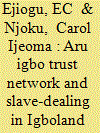

|
|
|
|
|
| Summary/Abstract |
Although existing research on trust networks shows that ethnic networks, for example, have sustained long-distance trade from the origins of cities and states onward, this article reveals that, even in the absence of connections to cities and states, by their nature and because of their commitment component, trust networks can also be uniquely customized and made to lend themselves to the peculiar enterprise that was slave-dealing in Igboland, even in contexts that are devoid of cities and states and their governmental trappings. This assertion about trust networks is substantiated in the article with an account of the effectiveness of the Aru Igbo trust network, which enabled the extensive participation of the Aru1 Igbo in the slave trade in the lower southeast Niger basin. Also, the article taps into Charles Tilly’s theoretical formulation on error correction to demonstrate that, in spite of the error, correction measures adopted by the abolitionist campaigners to bolster the purposive action that characterized the initial phase of their campaign, slave-dealing and trade in Igboland and in the lower southeast were sustained in spite of all that largely because of the durability and resilience of the Aru Igbo trust network.
|
|
|
|
|
|
|
|
|
|
|
|
|
|
|
|
| 2 |
ID:
153107
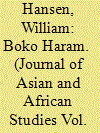

|
|
|
|
|
| Summary/Abstract |
This article is interested in shedding light on why a phenomenon such as Boko Haram came into existence and why it poses a threat to the very existence of the Nigerian state. The Boko Haram phenomenon, I argue, can only be understood as a reaction to more than a half century of corruption, venality, poverty, and abuse by the state predator class. My argument is that Boko Haram is the entirely logical consequence of more than five decades of the post-colonial Nigerian state ruled by a parasitic predator class that is itself a by-product of the colonial state.
|
|
|
|
|
|
|
|
|
|
|
|
|
|
|
|
| 3 |
ID:
153100
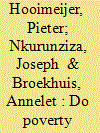

|
|
|
|
|
| Summary/Abstract |
The Rwandan Government has implemented various education policies that contribute to higher enrolment in education, but has become aware that these policies might be less effective for children from poor families. This study investigates the contribution of poverty reduction programmes on education expenditure of households. Using a multi-level regression analysis, combining district data on labour markets with detailed expenditure data on 7,230 households, it teases out the effects of several social protection programmes. The results show that access to health insurance and to waged work are positively related, while direct financial or in kind support are negatively related to paying into the children’s schooling. Non-agricultural employment opportunities in particular seem to stimulate education investments. Reducing the vulnerability of households might provide more equal access to these opportunities.
|
|
|
|
|
|
|
|
|
|
|
|
|
|
|
|
| 4 |
ID:
153098
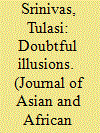

|
|
|
|
|
| Summary/Abstract |
This article examines the embattled intersection of magic and rationality in the transnational Sathya Sai movement and positions the magical materializations of the charismatic “godman” Sathya Sai Baba, and the sacred objects thus produced, within the neo-liberal economy. It then explores the tensions between the twin processes of magical production and rational debunking set against the framework of the discourse of nation building in contemporary India as it seeks to be and sustain a global power. The article illuminates the two conflicting discourses of materiality and rationality. It demonstrates that both are ethical subjectivities situated with regard to virtue—a “virtuous materiality” and a “virtuous rationality” —that together create a “critical politics of virtue”. The article concludes by tentatively suggesting that the critical politics of virtue can liberate current theory from a unitary understanding of ethical subjectivity in a neo-liberal world.
|
|
|
|
|
|
|
|
|
|
|
|
|
|
|
|
| 5 |
ID:
153102


|
|
|
|
|
| Summary/Abstract |
This research was undertaken to explore experiences of xenophobia by refugees from the Democratic Republic of Congo (DRC) with the health care system in Durban, South Africa. The study adopted a qualitative methodology consisting of 31 in-depth interviews with refugees from the DRC. Framework analysis was conducted. The findings revealed that refugees face medical xenophobia during their encounter with health care workers with language barriers and documentation as the first stumbling block in efforts to seek health care services. The pervasiveness of xenophobia is also experienced in prejudice evident in ethnic slurs, unwelcome and insensitive comments and discriminatory practices, including denial of treatment, contributing to inequality in health care delivery.
|
|
|
|
|
|
|
|
|
|
|
|
|
|
|
|
| 6 |
ID:
153099
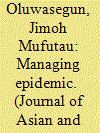

|
|
|
|
|
| Summary/Abstract |
This paper examines how the British managed the 1918–1919 influenza epidemic in Lagos, the reactions of the local population to new sanitary and medical policies enforced during the period, and its social and political implications for future epidemic management in the colony. Unlike several studies which approach the history of the pandemic from global and national perspectives, a focus on Lagos, the colonial capital of Nigeria, one of Britain’s most important colonies provides this paper with a rare opportunity to engage with how local peculiarities informed decisions about the resolution of a global problem. Lagos is chosen as the terrain for discussion because of the ample data generated about it in the course of the 19th and 20th centuries (not just between European missionaries and the indigenous Lagosians, but also for other influential cultural and ethnic groups such as the Saro and Amaro (migrants from Brazil), and the Indian influence on medical policies in Lagos).
|
|
|
|
|
|
|
|
|
|
|
|
|
|
|
|
| 7 |
ID:
153105
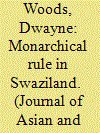

|
|
|
|
|
| Summary/Abstract |
This article adopts a non-formalized decision−theoretic model to examine patronage strategies by the monarchy in Swaziland as a means to stave off threats to its hold on power. The article’s main argument is that the logic of patronage is largely about controlling and monitoring local chiefs and placating royal princes with administrative positions and sources of revenue and limiting the insurrectionary potential of non-traditionalist urban groups to absolute monarchical power in Swaziland.
|
|
|
|
|
|
|
|
|
|
|
|
|
|
|
|
| 8 |
ID:
153103


|
|
|
|
|
| Summary/Abstract |
This paper examines the challenges confronting community-based geotourism as a tool for Local Economic Development in a poor rural community based in the Free State province of South Africa. Data were collected through interviews that were held with participants of the Witsie Cave project, local community leaders and municipal officials, as well as through the content analysis of the project’s documents. The results indicate the need to address a conundrum of intertwined endogenous and exogenous conditions as a strategy for enhancing the viability of community-based geotourism projects.
|
|
|
|
|
|
|
|
|
|
|
|
|
|
|
|
| 9 |
ID:
153101


|
|
|
|
|
| Summary/Abstract |
The benefits of early childhood development (ECD) programmes are strongly supported by evidence of reduced school dropout and repetition rates. However, the literature on ECD is primarily grounded in research based in the United States (US); in the light of this gap in the literature, this paper provides a comparative overview of ECD policy and practice from outside of the US, namely in South Africa and Turkey. As a theoretical framework the paper has followed the World Bank’s Systems Approach for Better Education Results (SABER)-ECD Analytical Framework. Findings indicate that both countries have established an enabling policy environment for ECD but implementation and the setting of and compliance to standards for quality is still emerging, in spite of massive strides made in this field during the past fifteen years.
|
|
|
|
|
|
|
|
|
|
|
|
|
|
|
|
| 10 |
ID:
153104


|
|
|
|
|
| Summary/Abstract |
This study examines the risk associated with inconsistent use of condoms as a risk factor for human immunodeficiency virus/sexually transmitted infections (HIV/STIs) and sexual risk behaviours. The Malawi Demographic Health Survey 2010 data were used. Out of a sample of 2987 males and 9559 females aged 15–24 years, 511 males and 675 females were filtered in the present study. A Chi square test and logistic regression techniques were performed. About 147(28.7%) males and 240(35.6%) females reported inconsistent condom use. The likelihood of inconsistent condom use was higher among females with secondary/higher education (odds ratio’s (OR)=1.46), with more than one partner (OR=4.27), and married males (OR=8.76), with more than one sex partner (OR=1.78).There is a need to raise condom use awareness and improve sexual education about consistent condom use, especially among females, in order to curb the spread of HIV/STIs and reduce sexual risk behaviours.
|
|
|
|
|
|
|
|
|
|
|
|
|
|
|
|
|
|
|
|
|